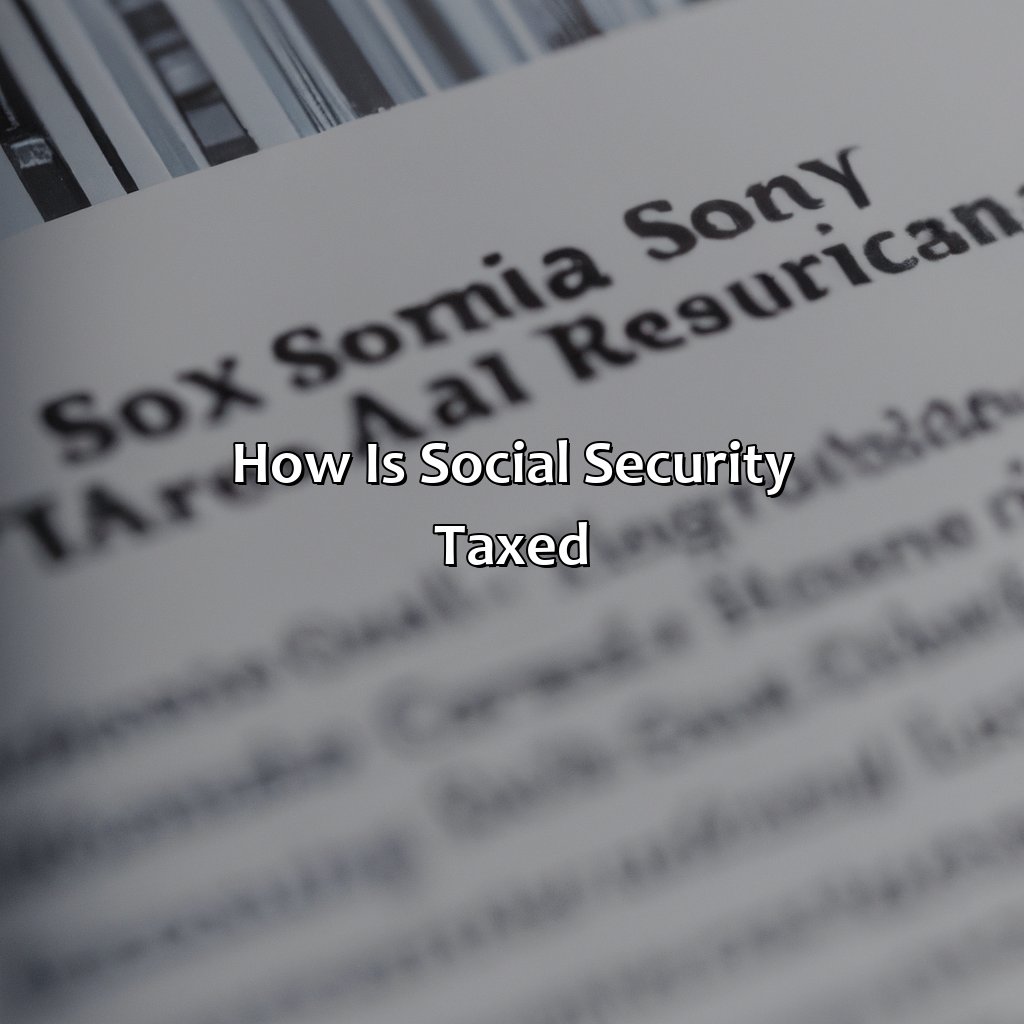How Is Social Security Taxed?
Key Takeaway:
- Social Security benefits may be subject to taxation, depending on an individual’s income level. Generally, if an individual’s provisional income exceeds a certain threshold, a portion of their Social Security benefits may be taxable.
- The income thresholds for taxation of Social Security benefits vary based on marital status and filing status, and may change from year to year. The calculation of Social Security taxation is based on a formula that takes into account an individual’s income, as well as a portion of their Social Security benefits.
- In addition to federal taxes, Social Security benefits may also be subject to Medicare taxes and state taxes, depending on the state in which the individual resides.
- To reduce the amount of Social Security taxation owed, individuals may consider managing other sources of retirement income and implementing tax planning strategies, such as timing the receipt of income to minimize tax liability.
Are you concerned about how your Social Security income is treated when it comes to taxes? You’re not alone – find out how this important source of retirement income is taxed here. This article will help you understand the taxation of Social Security income and plan your finances accordingly.
Overview of Social Security Taxation
Social Security can impact an individual’s income tax return. The taxation of social security benefits depends on the taxpayer’s income, filing status, and tax liability. The amount of social security benefits subject to tax increases as the taxpayer’s total income increases above a certain limit. The tax rate on the benefits also increases as the income increases. It is important for taxpayers to understand their tax liability related to social security benefits in order to properly plan and prepare for tax season.
Additionally, some individuals may be subject to a Medicare tax on their social security benefits. This tax is only applicable to those with high incomes, specifically those who earn above a certain threshold. The Medicare tax rate is 2.9% and is split between the employee and employer.
It is important to note that social security benefits are not taxed at the same rate as regular income. The taxable portion of social security benefits can range from 0% to 85%, depending on the individual’s financial situation.
According to the Social Security Administration, in 2020, approximately 64 million people collected social security benefits.
Source: https://www.ssa.gov/planners/taxes.html

Image credits: retiregenz.com by Adam Duncun
Taxation of Social Security Benefits
As Social Security benefits are received by millions of Americans, it’s important to understand how the taxation of these benefits works. The percentage of Social Security benefits subject to federal income tax varies depending on the total amount of income received, with higher-income earners facing a higher tax rate.
In addition to the income level, the amount of taxation can also be affected by whether an individual files as an individual or jointly with a spouse. Furthermore, some states may also tax Social Security benefits. To calculate the amount of taxes owed on Social Security benefits, the provisional income must be determined first. This is the total income received by an individual, including any tax-exempt interest and half of their Social Security benefits.
It’s important to note that not all Social Security benefits are taxable. Specifically, those who rely solely on Social Security for their income may not have to pay any taxes on their benefits. However, for others, this taxation can be a significant financial burden, leading to potential financial strain and difficulties.
To avoid the fear of missing out on proper financial planning and to ensure the correct filing of income taxes, it’s crucial for individuals to seek the advice and assistance of a qualified tax professional or financial planner. By following the proper steps and staying informed, individuals can make informed decisions about their Social Security benefits and avoid any potential tax-related issues.

Image credits: retiregenz.com by Yuval Duncun
Other Taxes on Social Security
Social Security benefits may be subject to other taxes, such as federal income tax and state taxes. The amount of taxation depends on the recipient’s total income, including Social Security income. Taxation may range from 0% to 85% of Social Security benefits, depending on the individual’s income level. Additionally, some states may tax Social Security benefits while others do not. It is important for retirees to understand how other taxes on Social Security may affect their overall income.
Seniors who earn more than a certain threshold, based on their filing status, will need to pay taxes on a portion of their Social Security benefits. The threshold amounts are determined by the IRS each year. Those who receive other sources of income, such as pensions, investment income, or wages, may also have to pay taxes on their Social Security benefits.
Furthermore, there are some states that may tax Social Security benefits differently than federal taxes. For example, in some states, seniors may qualify for exemptions or credits that could lower their state taxes on Social Security income. It is important for retirees to research the tax laws in their state to understand how Social Security benefits will be taxed.
In addition to federal and state taxes, some seniors may also be subject to Medicare taxes on their Social Security benefits. This applies to individuals who are still working and earning income while receiving Social Security benefits. The Medicare tax rate is 1.45% for employees and 2.9% for self-employed individuals.
One retiree faced a financial burden due to the unexpected taxes on her Social Security benefits. She was unaware that her other sources of income would cause her Social Security benefits to be taxed. She had to adjust her budget and seek financial advice to manage the impact of these taxes on her income.

Image credits: retiregenz.com by Harry Arnold
Strategies to Minimize Social Security Taxation
Social Security taxation can be minimized by applying certain effective strategies. These strategies can help individuals avoid paying high taxes on their Social Security benefits. Here are six strategies to consider:
- Delay taking Social Security benefits
- Manage taxable income
- Choose tax-efficient investments
- Perform Roth IRA conversions
- Consider moving to a tax-friendly state
- Maximize non-taxable income sources
By delaying Social Security benefits, individuals can increase the amount they receive in the future, resulting in lower taxes. Managing taxable income may be done by reducing the amount of tax owed on other types of income or by taking advantage of deductions and credits. Choosing tax-efficient investments and performing Roth IRA conversions can also help reduce Social Security taxes. Moving to a tax-friendly state may offer valuable tax savings, and maximizing non-taxable income sources like retirement account distributions can also help.
Individuals can further reduce Social Security taxation by following good financial practices like saving for retirement, reducing debt, and budgeting effectively. These suggestions work by reducing the amount of taxable income that an individual earns, resulting in lower taxes. By applying these smart strategies, individuals can minimize their Social Security taxes and enjoy a brighter financial future.

Image credits: retiregenz.com by David Duncun
Some Facts About How Social Security Is Taxed:
- ✅ Up to 85% of social security benefits can be subject to taxation. (Source: Social Security Administration)
- ✅ The amount of social security benefits subject to taxation depends on the recipient’s income and filing status. (Source: IRS)
- ✅ If social security benefits are a recipient’s only income, they generally will not be taxed. (Source: AARP)
- ✅ There is a worksheet provided by the IRS to help calculate the taxable portion of social security benefits. (Source: Investopedia)
- ✅ Depending on the state, social security benefits may also be subject to state income tax. (Source: The Balance)
FAQs about How Is Social Security Taxed?
How is Social Security taxed?
Social Security benefits can be taxed up to 85% of the amount received. The amount of tax depends on the individual’s income and filing status. Those with lower income may not be taxed at all, whereas those with higher income will likely see more of their benefits taxed.
Who is required to pay taxes on Social Security benefits?
Not everyone who receives Social Security benefits is required to pay taxes on them. However, if an individual’s income exceeds a certain threshold, their benefits may be subject to taxation. The threshold amounts are $25,000 for single filers and $32,000 for married couples filing jointly.
How can I know if my Social Security benefits are taxable?
Individuals can determine if their Social Security benefits are subject to taxation by reviewing their annual Social Security Benefit Statement (Form SSA-1099). The statement shows the total amount of benefits received, as well as any taxes withheld.
Are Social Security taxes deducted from my benefits?
Social Security taxes are deducted from an individual’s paycheck during their working years to fund the program. However, when they start receiving benefits, taxes may still need to be paid on those benefits, depending on the individual’s income and filing status.
Can I have Social Security taxes withheld from my benefits?
Yes, individuals can request to have taxes withheld from their Social Security benefits by completing Form W-4V (Voluntary Withholding Request). This may help to prevent owing a large sum of money when filing taxes.
How can I file taxes on my Social Security benefits?
Taxes on Social Security benefits can be filed using the same tax return forms used for other types of income. Individuals can file either electronically or by mail. It is recommended to consult with a tax professional for assistance in filing taxes on Social Security benefits.


